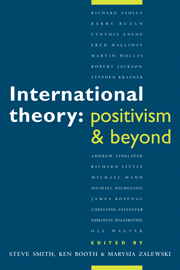Book contents
- Frontmatter
- Contents
- List of contributors
- Preface and acknowledgements
- Introduction
- I Debates
- II Legacies
- III Silences
- IV Openings
- V Directions
- 14 The last post?
- 15 Probing puzzles persistently: a desirable but improbable future for IR theory
- 16 The future of international relations: fears and hopes
- 17 75 years on: rewriting the subject's past – reinventing its future
- 18 ‘All these theories yet the bodies keep piling up’: theories, theorists, theorising
- Index
14 - The last post?
Published online by Cambridge University Press: 09 March 2010
- Frontmatter
- Contents
- List of contributors
- Preface and acknowledgements
- Introduction
- I Debates
- II Legacies
- III Silences
- IV Openings
- V Directions
- 14 The last post?
- 15 Probing puzzles persistently: a desirable but improbable future for IR theory
- 16 The future of international relations: fears and hopes
- 17 75 years on: rewriting the subject's past – reinventing its future
- 18 ‘All these theories yet the bodies keep piling up’: theories, theorists, theorising
- Index
Summary
Reason is the pace; increase of science the way, and the benefit of mankind the end.
Thomas Hobbes (Leviathan. ch. V)These words make a fine inscription for the gateway at the start of the Enlightenment trail. They promise mastery and control of nature, to be gained, Hobbes believed, by applying Reason to the discovery of causal forces, laws and mechanisms throughout the natural realm. Since human beings belong to the order of nature, this same method would illuminate the social world also. It would reveal the art of creating and maintaining commonwealths, thus resolving the problem of social order at home and abroad. By applying Reason to nature we were first to see why there is a problem of order, then to learn to solve it by constructing a Leviathan armed with the power of the sword to keep all in awe and sanctified with the artificial virtue of justice. Increase of science would bring peace, a prospect of commodious living and a restless kind of felicity.
Had Reason set as firm a pace as Hobbes hoped, our conference would not have been held. The Enlightenment trail started splendidly with increase of science in mathematics, physics and biology. Light was soon cast on the secrets of nature to great practical effect and, whatever one's post-modern doubts about Reason, there is no denying the illumination gained. Think, for instance, how human life has been transformed by the lightbulb, the horseless carriage, the atomic bomb, the laser gun and the formula for Coca-Cola. Although such examples may challenge Hobbes's faith in the benefit of mankind, they demonstrate his case for the power of Reason to control nature.
- Type
- Chapter
- Information
- International TheoryPositivism and Beyond, pp. 301 - 308Publisher: Cambridge University PressPrint publication year: 1996
- 2
- Cited by



